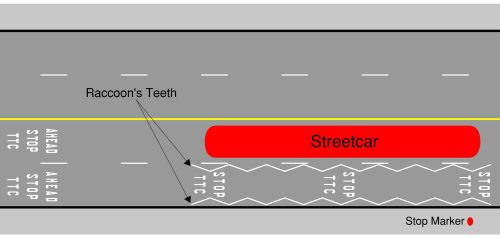
As part of the City of Toronto’s Vision Zero commitment to eliminate traffic-related fatalities and serious injuries, Transportation Services and the TTC are undertaking a pilot project to evaluate the effectiveness of enhanced pavement markings at select TTC streetcar stops. This initiative aims to improve pedestrian safety where people board and alight streetcars in mixed traffic lanes by increasing stop compliance by people driving.
Between 2014 and 2024, 141 collisions were reported where people driving illegally passed open streetcar doors and struck a pedestrian. Approximately 60% of involved pedestrians required hospitalization. These figures highlight the need for improved awareness and compliance for people driving at streetcar stops.
The pilot introduces zig-zag pavement markings (“Raccoon’s Teeth”) within the stop where people board and alight, along with advance warning messages on the roadway to alert people driving and using micromobility (including people on bikes) they are approaching a streetcar stop and may need to stop. These visual cues are designed to increase awareness and encourage safer behavior for people driving.

Streetcar operations are unique to a few major cities in North America, and Toronto is home to one of the most extensive streetcar networks. Stops located in mixed traffic lanes present a distinct safety challenge that calls for creative solutions. The proposed zig-zag pavement markings resemble the sharp, triangular shape of raccoon teeth – making streetcar stop locations more visible to people driving. Since the racoon is a well-known urban symbol in Toronto, the nickname is a natural fit for this new local safety treatment.
The pilot includes several high-ridership streetcar stops across four TTC routes:
Control sites with similar conditions have also been selected to ensure accurate comparisons for the study.
Findings from this pilot will help guide future safety enhancements at TTC streetcar stops. Updates on the pilot and recommendations following the evaluation will be shared on this page when they are available.